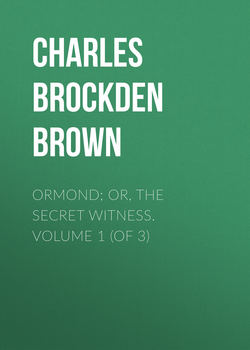Читать книгу Ormond; Or, The Secret Witness. Volume 1 (of 3) - Charles Brockden Brown - Страница 1
INTRODUCTION
ОглавлениеTo I.E. Rosenberg.
You are anxious to obtain some knowledge of the history of Constantia Dudley. I am well acquainted with your motives, and allow that they justify your curiosity. I am willing to the utmost of my power to comply with your request, and will now dedicate what leisure I have to the composition of her story.
My narrative will have little of that merit which flows from unity of design. You are desirous of hearing an authentic and not a fictitious tale. It will therefore be my duty to relate events in no artificial or elaborate order, and without that harmonious congruity and luminous amplification, which might justly be displayed in a tale flowing merely from invention. It will be little more than a biographical sketch, in which the facts are distributed and amplified, not as a poetical taste would prescribe, but as the materials afforded me, sometimes abundant and sometimes scanty, would permit.
Constantia, like all the beings made known to us, not by fancy, but experience, has numerous defects. You will readily perceive that her tale is told by her friend; but I hope you will not discover many or glaring proofs of a disposition to extenuate her errors or falsify her character.
Ormond will perhaps appear to you a contradictory or unintelligible being. I pretend not to the infallibility of inspiration. He is not a creature of fancy. It was not prudent to unfold all the means by which I gained a knowledge of his actions; but these means, though singularly fortunate and accurate, could not be unerring and complete. I have shown him to you as he appeared on different occasions, and at successive periods to me. This is all that you will demand from a faithful biographer.
If you were not deeply interested in the fate of my friend, yet my undertaking will not be useless, inasmuch as it will introduce you to scenes to which you have been hitherto a stranger. The modes of life, the influence of public events upon the character and happiness of individuals in America, are new to you. The distinctions of birth, and the artificial degrees of esteem or contempt which connect themselves with different professions and ranks in your native country, are but little known among us. Society and manners constitute your favourite study, and I am willing to believe that my relation will supply you with knowledge, on these heads, not to be otherwise obtained. If these details be in that respect unsatisfactory, all that I can add, is my counsel to go and examine for yourself.
S.C.
Germany
